On Thursday, the 9th of March, Finance Magnates Russia reported on the seventh brokerage to receive a Forex broker operating license from the Bank of Russia. Instaforex joins the list of six other brokerages that fulfil the bank's requirements, effectively allowing its regulated subsidiary to operate in the country.
Two years in the making, and now a year into official Regulation , one would think that firms would be on-boarding clients and advertise their products already… except they can’t.
[gptAdvertisement]
As it turns out that the Bank of Russia’s regulatory framework, developed and voted through by the Russian parliament, does not allow regulated subsidiaries to operate freely in Russia yet. To be more precise, brokers can operate, but they can’t advertise.
What Does Russian Regulation Mean?
The framework takes a different view on the free market. As is usually the case with authoritarian regimes, regulation is frequently used to accommodate the needs of special interests.
Over the past year (actually longer), the Bank of Russia has been working to completely rearrange the industry.
Veteran brokers, members of the only self-regulatory organization (SRO) in the country, have been swamped by legal requirements and formalities. The same brokers that established a groundwork in order to gain the trust of investors.
Meanwhile, companies that have been widely abusing the trust of their clients, and in some cases subjected to criminal investigations, have been handed a license. The Bank of Russia’s standards are a mystery, and the license requirements are a necessity for every brokerage that wishes to legally advertise in Russia.
The Bank of Russia handed out the papers to virtually everyone who applied and created a parallel SRO that is mandatory for all the companies running a local subsidiary.
Should Russian Clients Care about Russian Regulation?
In May the official regulatory framework is set to become operational. Yes, brokers that have been granted a license so far have not been able to use it until now and won’t be able to until about two months from now.
Brokers that are currently operating in Russia are doing so without advertising via offshore subsidiaries. Foreign companies in the market have been relying on their brand reputation and the ingenuity of Russian citizens to find the best broker to trust.
When in comes to trust in state institutions, the Russian government has a reputation. Rather than trusting the local central bank, many Russians prefer to open accounts in offshore jurisdictions with regulators they can irrevocably trust.
The Bank of Russia's stamp of approval is not a factor for customers choosing the brokerage that will keep their trading accounts safe.


















